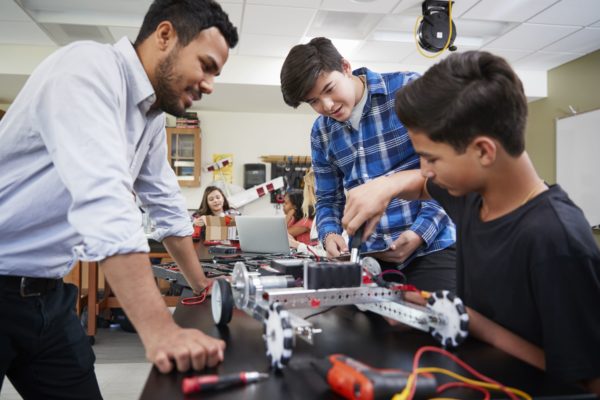Advancements in science and technology have become part of our everyday lives—there is a growing need for students to have a strong foundation in technology, math, and science to be successful in the future. Unfortunately, fewer and fewer students are developing a strong understanding of these subjects.
STEM is an acronym for science, technology, engineering, and math. STEM education can help bridge gaps in learning and help prepare students for success in the classroom and beyond. Keep reading to discover what STEM is and 7 reasons why STEM learning is important in early childhood education.
What Is STEM Education?
Instead of focusing on science, technology, engineering, and math individually, STEM education combines them into an integrated, real-world learning experience.
The future will have a need for many STEM-related jobs to keep up with constant technological innovations. As a result, there is a greater need for students to focus on these areas of learning to better prepare themselves for future success.
STEM programs are usually very hands-on to give students the opportunity to apply their learning, but there are many other benefits of STEM education in early childhood education.
Why Is STEM Important In Early Childhood Education?
1. It Sets Foundation For Future Learning
Science, physics, and math are tough subjects for many students. An introduction to STEM in early education helps students better prepare for more difficult courses in high school and post-secondary education.
2. Encourages Creativity And Imagination
STEM learning involves more than just one solution to a problem. Unlike traditional textbook learning, STEM encourages students to think outside the box to develop creative solutions to problems.
3. It Teaches Foundational, Transferable Skills
STEM education encourages students to build core skills that are essential for future success in school and beyond. Some of these skills include:
- Critical thinking
- Teamwork
- Trial and error experimentation
- Problem solving
- Independent learning
4. It Features Blended Learning
STEM education extends far beyond what is taught in the traditional classroom. Since science, math, and other tech-related subjects are taught independently in school, STEM offers students the opportunity to pull knowledge in each of these subjects to solve the problem at hand.
5. There Is A Growing Need For STEM-Related Jobs
Since technology is ever-evolving, many jobs in the future will require knowledge of math and science. A solid understanding of these subjects can help students better prepare for their future careers and give them a leg up in the job application process. Our STEM program gives students the opportunity to learn applied skills like coding, engineering, design, and experimentation while having fun designing and building robots.
6. Encourages Knowledge Application
Since STEM is so hands on, it encourages students to apply their knowledge to develop solutions. Instead of standard textbook and written work, STEM education is an opportunity for students to practice what they are learning and apply it to real-world problems.
7. It Helps Students With Certain Learning Styles
Some students learn best by reading or listening, while others learn best by doing (kinesthetic learners). These hands-on learners benefit from experimentation, making STEM education an excellent way to learn, process, and remember information.
Help Your Child Learn Better With STEM
STEM education is an important part of a child’s learning. More than just a required class, STEM encourages a child to apply his or her learning and build confidence in difficult subjects like math and science.
Register your child in our STEM tutoring program today!
